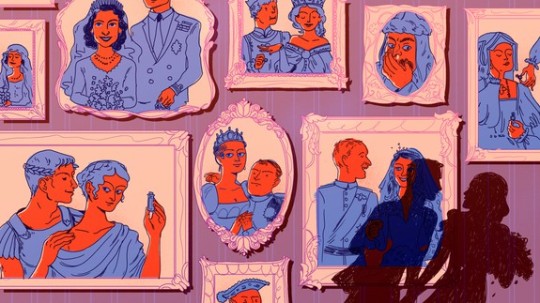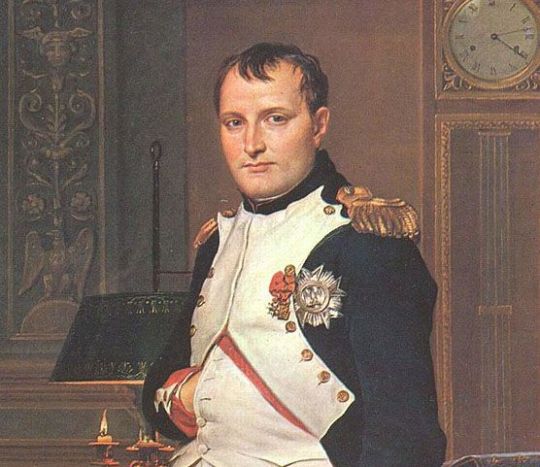#_uuid:5b8c7d95-45b6-3f13-b217-713f01428f53
Explore tagged Tumblr posts
Text
6 royal weddings from history that blow Harry and Meghan's out of the water

Sure, Harry and Meghan's wedding looks fun, but when you compare it to what came before it's basically just tea and biscuits in a rec-centre.
SEE ALSO: The acting roles of Meghan Markle before her royal engagement
History is littered with royal weddings full of violence, opulence, drunkenness and the occasional naked dude. Here for your enjoyment are just a few examples.
1. Henry VI and Margaret of Anjou, "the original Harry and Meg" (1445)
Medieval royal weddings really pulled out all the stops, and historian Dr James Clark described the marriage of Henry VI and Margaret of Anjou to Mashable as "the original medieval Harry and Meg." This is because Clark thinks Margaret was the first royal bride to be the subject of public discussion, which — while commonplace today — was unusual 500 years ago.
"She was described in almost tabloid terms," said Clark. Apparently she was called "a good-looking and well-developed girl," and "mature and ripe" despite being 23, and "a most handsome woman, although somewhat dark." Clark reads "somewhat dark" as code for "foreign-looking."
Like Meghan, Margaret was a foreign bride, but in 1445 this had much more significance. To the people of medieval Britain, the French princess was a symbol of peace after "100 years of on-off wars with the French" according to Clark. So it was a pretty big deal.
A royal wedding was a way more public affair back in the day. The public were able to mingle with the royal retinue, and were even allowed to touch them — clapping the couple on the back to wish them all the best.
To top it off, red and white wine replaced the city's drinking water to celebrate the occasion, actually spurting out of public fountains. A stark contrast from Harry and Meghan's wedding where guests were told to bring their own lunch.
2. Attila the Hun dies of a nosebleed at his own wedding (453 AD)
Attila the Hun, a.k.a. "The Scourge of God," a.k.a. the guy who makes Khal Drogo look like a member of Greenpeace, was a pretty fearsome guy. Leader of the nomadic Hun armies, he razed whole cities to the ground. But in the end he was taken down not in battle or by a Drogo-style duel, but by a simple nosebleed.
Attila's death, like a lot of history, is shrouded in a healthy dose of mystery. There are a few different versions of it, but they all agree that the warlord died on his wedding night. Some accounts say he died of a nosebleed and choked on his own blood, others that he was murdered, or that his bout of heavy drinking led to internal bleeding.
Remind you of anyone?
3. Catherine of Aragon and Prince Arthur go full extra (1501)
Catherine of Aragon was famous for being the first wife of Henry "Commitmentphobe" Tudor, but first she was married to Henry's older brother, Prince Arthur.
They married when Arthur was just 15, but he died shortly after. After Arthur's death she was wed to Henry. Imagine if William died and Harry just swooped in and married Kate. Scandalous stuff, but in the 16th century it was just the practical thing to do.
For the actual ceremony Catherine's route to the church was paved with blue carpet, and she and young Henry wore matching outfits of silver embroidered with gold roses, while Prince Arthur wore pure white satin. The west door of the church also sported a good old fashioned wine fountain. Because why fix what ain't broke?

Catherine of Aragon, queen of the party.
Image: National Portrait Gallery London/wikimedia commons
Young Henry even led the wedding procession unaccompanied through London, aged only ten-years-old. You certainly wouldn't catch Prince George doing that today, but to be fair he is only four.
Catherine's wedding to Arthur was a spectacle to put the Met Gala to shame. Catherine arrived at the gates of the city riding a mule, and large swathes of London were transformed into an allegorical procession in which Catherine was cast as a star ascending into the heavens.
4. Napoleon and Josephine's ridiculously low-key wedding (1796)
Napoleon Bonaparte and his wife Josephine may have been regular citizens when they got married, but they ended up being Emperor and Empress of France, so they're getting a name-check.
According to Professor Martyn Bennett, Napoleon's wedding to Josephine was actually set up by Josephine's lover Paul Barras who wanted to get rid of her.
"Josephine had been [Barras'] mistress and effectively he was passing her on," Bennett told Mashable. While Bonaparte was besotted with her, for Josephine it was very much a marriage of convenience. The pair both lied about their age in the run up, both claiming to be 28 even though Napoleon was actually 26 and Josephine 32.

"Sorry babe, I was busy planning the invasion of Italy."
Image: national gallery of art/wikimedia commons
Being infatuated with his bride didn't stop Napoleon turning up a whole three hours late and shabbily dressed to his own wedding. "The wedding was supposed to happen at 7PM," said Bennett, "but he turned up at about ten." Apparently he'd been planning the invasion of Italy and lost track of the time.
The two were (eventually) married in a candle-lit room on the Rue D'Antin, with a just few witnesses and the mayor present. Least glam imperial wedding ever.
Being infatuated with his bride didn't stop Napoleon turning up a whole three hours late and shabbily dressed to his own wedding. "The wedding was supposed to happen at 7PM," said Bennett, "but he turned up at about ten." Apparently he'd been planning the invasion of Italy and lost track of the time.
The two were (eventually) married in a candle-lit room on the Rue D'Antin, with a just few witnesses and the mayor present. Least glam imperial wedding ever.
5. The Emperor Augustus and Livia a.k.a. the ultimate power couple (36 BC)
The first emperor of Rome Augustus (born Octavian) had a few marriages before settling down with Livia.
The pair were both married when they met, and Livia was heavily pregnant. This didn't stop them, however. Augustus promptly ditched his wife Scribonia, and Livia's husband was persuaded (or perhaps forced) to divorce her. The same husband-turned-baby-daddy gave her away at her wedding to Augustus. Super amicable break-up, right? Or maybe just a super awkward wedding ceremony...
Not much more is known about the celebrations themselves, but it seems they featured naked dudes just hanging out, because according to Roman chronicler Cassius Dio, "one of the prattling boys, such as the women keep about them for their amusement, naked as a rule," made an ill-judged joke about Livia's previous husband being in attendance. Learn to read the room, naked guy.
Livia has often been portrayed as political force of nature, not to mention a poisoner. Famous historian Robert Graves depicted her as having poisoned her husband Augustus after 52 years of marriage to ensure her son Tiberius became Emperor, but historians like Matthew Dennison dismiss this view of her as the result of sexist propaganda.
While we will never know for certain whether she poisoned people, what is certain is that Livia's descendents — not Augustus' — became Emperors, and was turned into an actual goddess after her death. There's little denying, she was one powerful lady.
6. George IV gets married while totally wasted (1795)
Prince George was the son of King George III, who you may remember from such hits as the American War of Independence, or more recently the musical Hamilton.
Prince George went on to become King George IV, and he had a reputation as a hedonist and a tearaway. This is perhaps epitomised by his wedding to his cousin Princess Caroline of Brunswick.
"On the day itself, George turned up to the wedding extremely drunk," Dr Kate Lister, curator of the Whores of Yore Twitter account, told Mashable. "He spent most of his wedding night passed out on the floor."
Classy. Here's hoping our own Prince George doesn't get any ideas. Once again, he is only four.
WATCH: The acting roles of Meghan Markle before her royal engagement

#_author:Isobel Hamilton#_uuid:5b8c7d95-45b6-3f13-b217-713f01428f53#_lmsid:a0Vd000000DTrEpEAL#_revsp:news.mashable
1 note
·
View note